
If you’re considering implants after dentures, schedule a consultation with Rise Dentistry today to explore your options and achieve a lasting smile!
If you've been wearing dentures for some time, you may wonder, “Can you get implants after dentures?” This is a common concern for many people. While dentures provide a temporary solution for missing teeth, they often come with discomfort, poor fit, and limitations when eating or speaking.
The good news is that implants after dentures are a viable option. Implants offer a permanent solution, providing a more natural look, feel, and function. Unlike dentures, they don’t slip or need constant adjustments. They also prevent jawbone loss, which can occur with long-term denture use.
Even if you’ve been using dentures for years, you can still explore the possibility of switching to implants. In this post, we’ll explore how switching to implants after dentures can improve your oral health and quality of life.
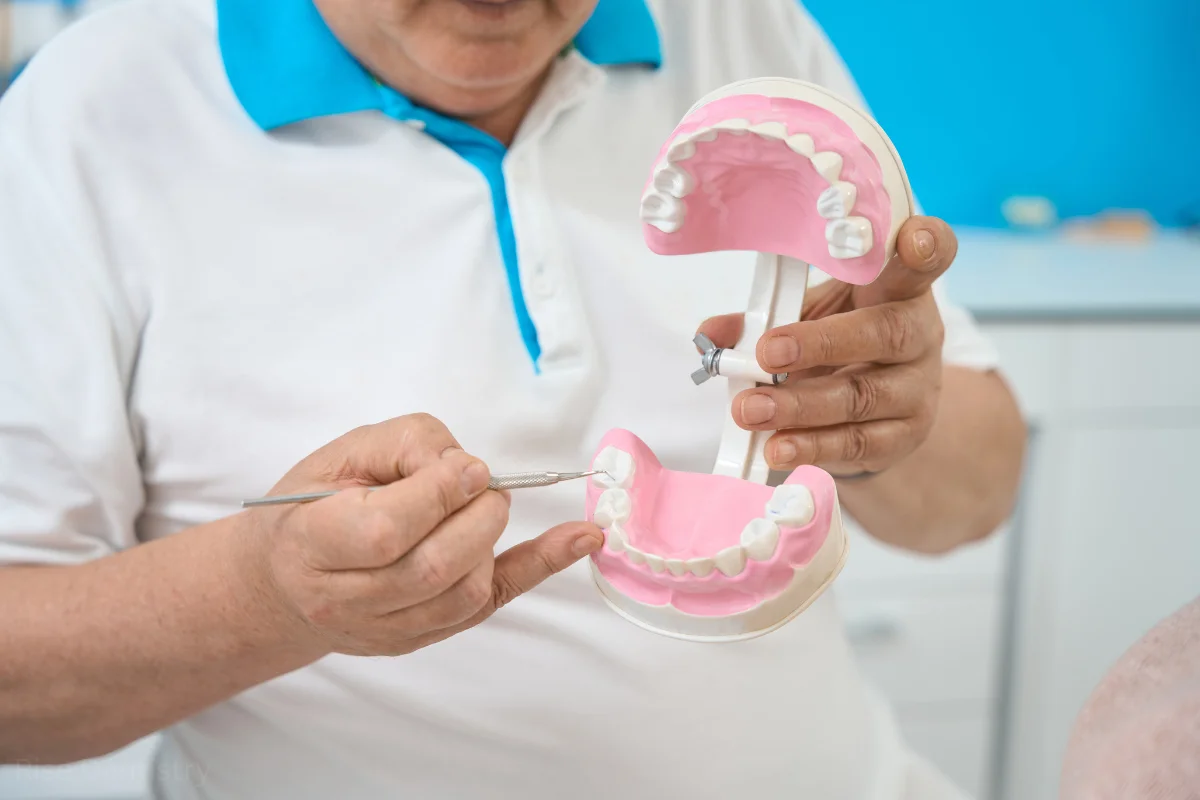
Many people with dentures face common frustrations like discomfort, poor fit, and challenges while eating or speaking. Dentures can slip or feel loose, causing embarrassment or inconvenience. Over time, you may also experience discomfort from the pressure dentures put on your gums.
Switching to dental implants for dentures can bring you a huge improvement in comfort. Unlike traditional dentures, dental implants with dentures provide a stable, permanent solution that feels and functions just like natural teeth. Implants won’t slip, and they help you speak and eat with confidence.
With dentures with implants, you get a more secure and comfortable fit. They offer long-term benefits, such as bone preservation, which traditional dentures can’t provide. Making the switch to implants means a more reliable and natural-looking smile that can last a lifetime.

They offer a more permanent solution for missing teeth. The procedure involves placing titanium posts into your jawbone. These posts act as artificial tooth roots. Over time, they fuse with the bone, creating a stable foundation for replacement teeth. This process is known as osseointegration and ensures the implants feel and function just like natural teeth.
In contrast, traditional dentures on implants are removable, and they rely on the gums for support. While dentures provide a temporary solution, they can cause discomfort, require frequent adjustments, and may slip or move while eating or speaking. On the other hand, dentures that you can wear all the time with implants offer more stability and comfort.
Unlike dentures, they don't need to be removed for cleaning. They are durable, long-lasting, and easy to maintain. Implants also preserve bone health, preventing the jawbone from shrinking over time, which is common with dentures.
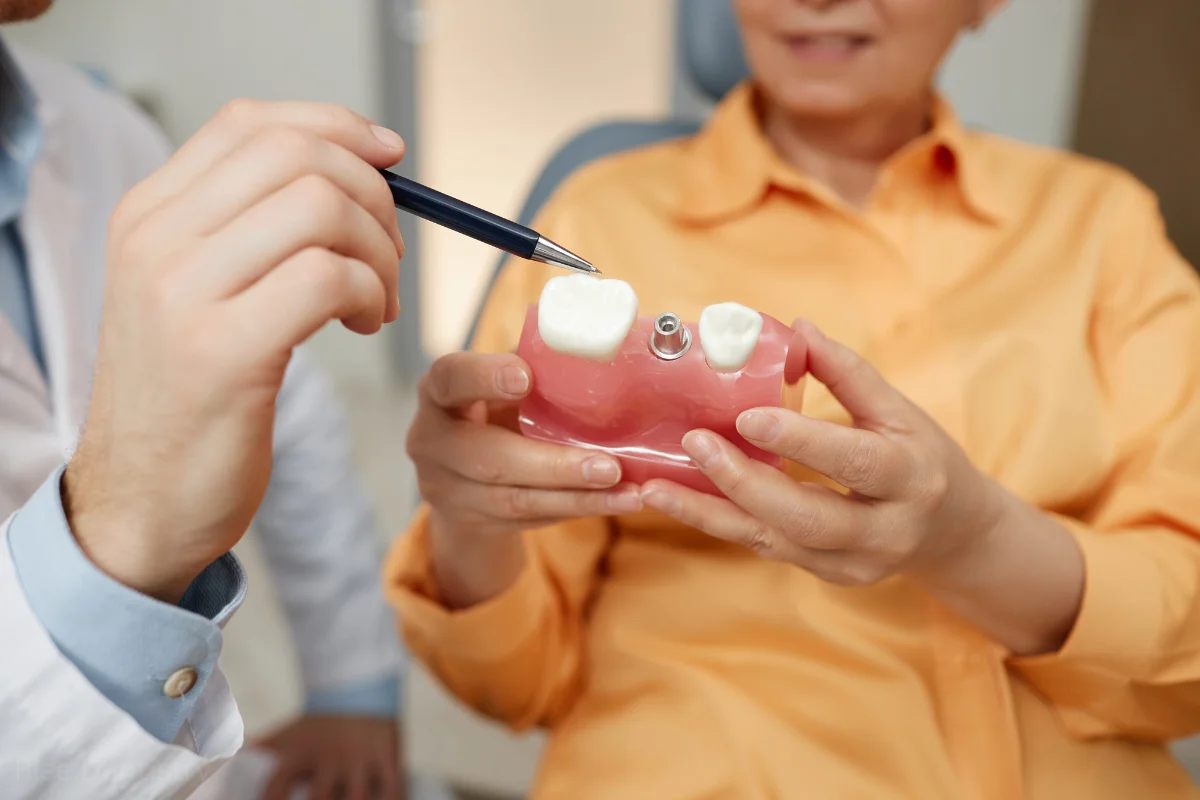
Wearing dentures for years can affect your jawbone. Without teeth, the jawbone doesn’t get the stimulation it needs, leading to bone loss and reduced bone density. This makes it more challenging to place implants later on.
To successfully support implant-supported dentures, sufficient bone density is required. If you’ve lost bone over the years, bone grafting can help. During this procedure, tissue is added to the jawbone to promote bone growth. Once the graft heals, the bone becomes strong enough to support implants.
Even after years of wearing dentures, bone grafting allows you to restore your jawbone’s strength. This makes implants after dentures possible, giving you a more secure and lasting solution for tooth replacement. With the right treatment, you can still enjoy the benefits of implants.

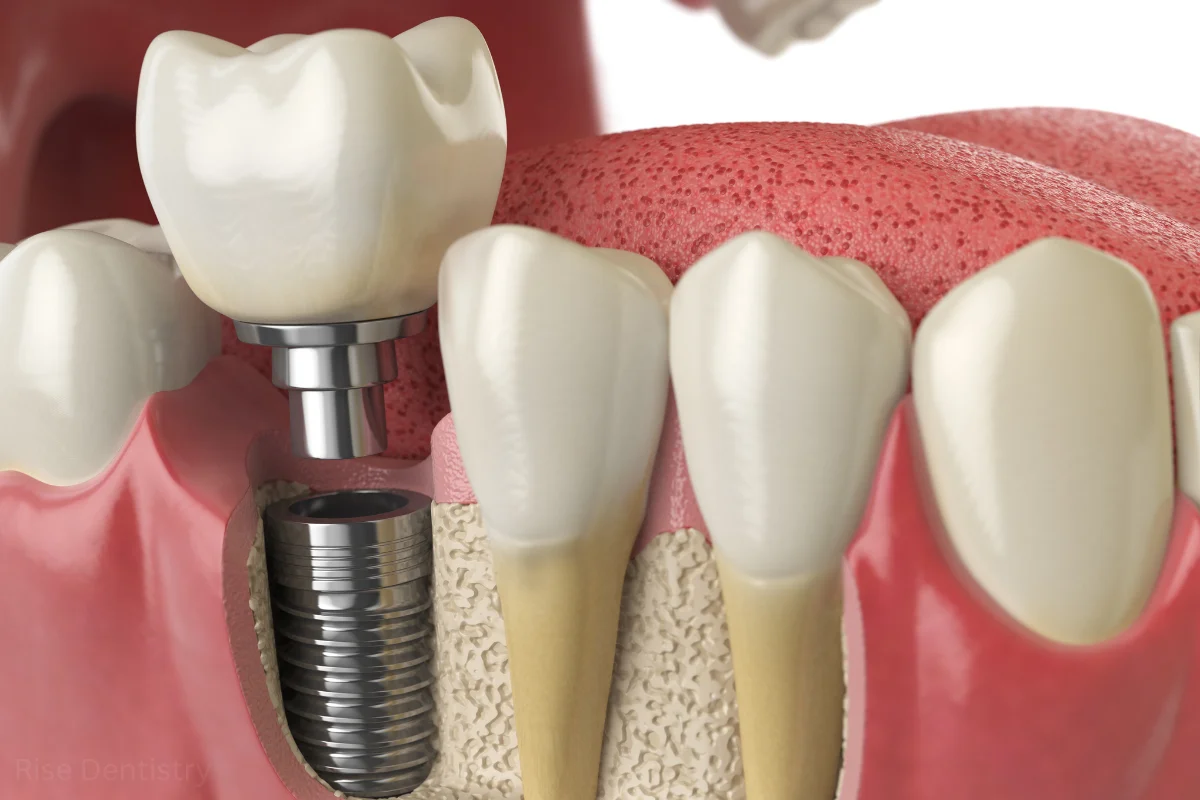
Bone grafting is a procedure used to restore lost bone density in the jaw. If you’ve been wearing dentures for years, your jawbone may have weakened due to lack of tooth stimulation. This can make it difficult to place implants securely.
During bone grafting, a surgeon adds bone material to the jaw. The bone may come from another part of your body or be synthetic. This procedure stimulates bone growth and allows the jaw to regain the strength needed for implant-supported bridges or implants after dentures.
Recovery time for bone grafting varies, but it usually takes a few months for the bone to heal fully. Once healed, the jaw is strong enough to support implants. If you are a good candidate, this step will ensure a stable foundation for long-lasting implants.

If you wear partial dentures, you may be wondering if it’s possible to switch to implants. The good news is, it’s not only possible but also a great option. Implant-supported dentures can replace a few missing teeth, providing a more stable and permanent solution compared to partial dentures.
Using implants to secure partial dentures offers several advantages. Unlike traditional partial dentures, implants don’t shift or cause discomfort. They also provide better support and preserve your jawbone, which can deteriorate with long-term denture use.
Implant-supported dentures are more comfortable, durable, and long-lasting. They restore your smile, allowing you to eat, speak, and smile with confidence. If you're ready for a more permanent solution, switching to implants could be the ideal choice for you.
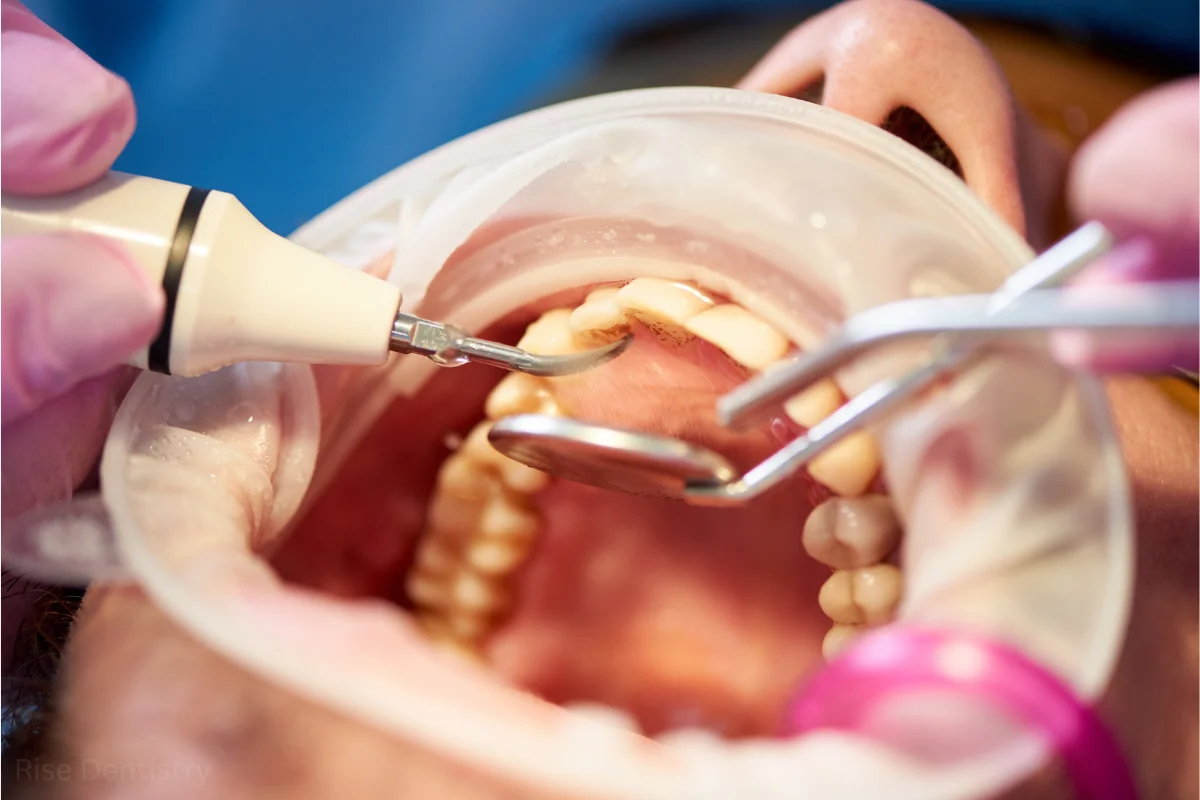

Strong bone and healthy gums are essential for ensuring implants stay secure.

A thorough check by a dentist is necessary to check for conditions like gum disease or insufficient bone that could affect the success of implants.

If you have gum disease or bone loss, additional treatments like bone grafting may be required before proceeding with implants.

Smoking or bruxism (teeth grinding) can affect the healing process and may make you ineligible for implants.

For personalized advice, consulting a Family Dentistry expert will determine if implants are the right option for you.

When comparing dental implants and dentures, the difference in longevity is significant. Implants can last a lifetime with proper care, making them a durable and long-term solution for missing teeth. With regular brushing, flossing, and routine dental visits, implants remain strong and secure.
On the other hand, dentures may need to be replaced every 5-7 years due to wear and tear. Over time, dentures may lose their fit, leading to discomfort or difficulty eating and speaking.
While denture over implants provides extra stability, implants themselves are more reliable in the long run. If you’re looking for a permanent solution, implants offer better durability and fewer maintenance concerns than dentures.
You can switch once your gums heal, which usually takes a few months.
Wearing dentures can cause bone loss, but implants are still possible with bone grafting.
You may need temporary dentures while waiting for your implant procedure.
Yes, implants have a higher cost but last longer.
Implants can last a lifetime, while dentures need replacement every 5-7 years.
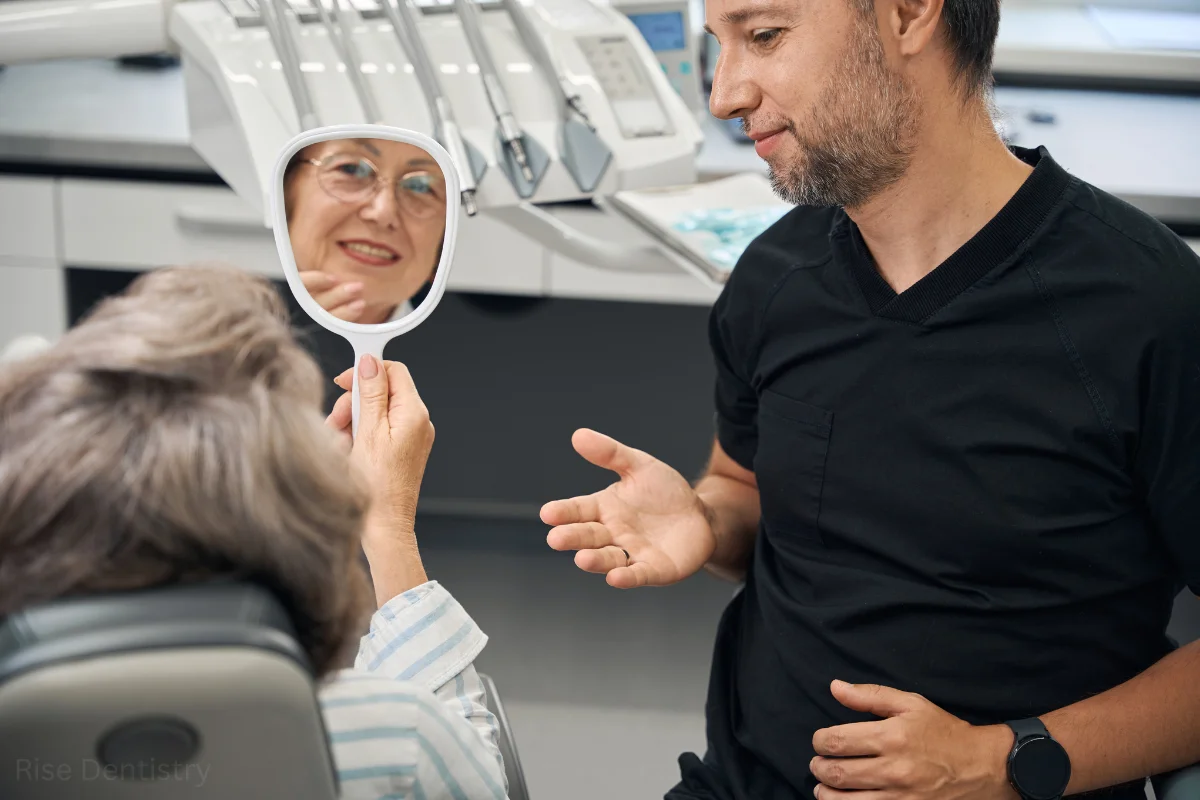
Switching from dentures to implants can greatly improve comfort, stability, and overall oral health. Denture implants provide a more permanent solution that looks and feels natural. With proper care, implants can last a lifetime, unlike dentures, which need frequent replacements.
If you’re considering this change, it’s important to consult with a dental professional. At Rise Dentistry, we can guide you through the dental implant procedure after dentures to ensure the best results.
Schedule a consultation today to learn more about the process and find out if implants are the right choice for you.

EXCELLENTTrustindex verifies that the original source of the review is Google. "For years, I avoided the dentist due to my anxiety. Dr. Hassan sorathia and their team completely changed my perspective. The office has such a calming atmosphere, and the staff is compassionate and understanding. They explained every step of my treatment and made sure I was comfortable. I'm so grateful I found them and can now take care of my teeth without fear."Posted onTrustindex verifies that the original source of the review is Google. Rise was amazing! They extracted a wisdom tooth from me and the experience was completely pain free. Thank you so much!Posted onTrustindex verifies that the original source of the review is Google. I’m so grateful I found Dr. Sorathia and his wonderful staff at Rise Dentistry! From the moment I called, his office was incredibly accommodating and got me in immediately. He was professional, kind, and patient, and he truly understood my dental anxiety. I never felt rushed or pressured and he welcomed all my questions and explained each step of the process so I always knew what was happening. He made sure I understood all of my options, allowing me to make the most informed decision for my care. I left feeling comfortable, informed, and confident about my treatment. I will absolutely be returning to Dr. Sorathia and highly recommend him to anyone looking for a compassionate and thorough dentist.Posted onTrustindex verifies that the original source of the review is Google. I’m so glad I found this office! Staff is so kind and professional. They keep your comfort at the top of their priority list. Wish I had found them sooner! Can’t recommend this dentist enough!Posted onTrustindex verifies that the original source of the review is Google. Excellent Staff and Dr Sorathia very knowledgeable pleasant ambiance !Posted onTrustindex verifies that the original source of the review is Google. Had a great experience, no wait time, in and out. Everyone was friendly, informative and professional.Posted onTrustindex verifies that the original source of the review is Google. So refreshing to meet an HONEST dentist who isn’t trying to upsell you anything. Just tells you the facts doesn’t try to sway your opinion, just lays out the options based on facts and allows you to choose for yourself what works best for you. I definitely highly recommend!Posted onTrustindex verifies that the original source of the review is Google. Fantastic service! Had a bad tooth that was absolutely killing me for several days. I load going to the dentist so I don’t have a normal one. Set the appointment in the morning and got in that same day. The dentist explained saving versus extracting the tooth and 35 minutes later I was going home. He was extremely thorough and telling me what he was going to do and with the post office instructions. The staff both out front and his assistants were fantastic!! absolutely could not have asked for a better experience and he will be my dentist going forward.
© 2023-2025 Rise Dentistry. All rights reserved.